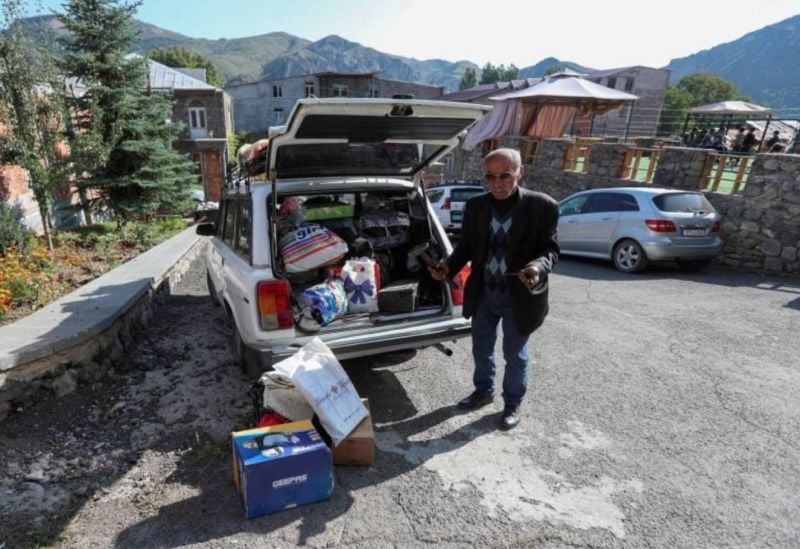
An Armenian man checks his cargo before leaving Nagorno-Karabakh for Goris, Armenia, September 28. (Credit: Reuters/Irakli Gedenidze)
Mariam Sohomonyan made her way between cars with canvas-bagged roofs and white tents set up by the Armenian Red Crossin Kornitzer, the last Armenian village before the Azerbaijan border and the Lachin corridor, leading into Nagorno-Karabakh.
She carried fruit juice and bread distributed by volunteers, as she wound her way through passing lorries and buses that kicked up dust and brought tears to the eyes of those who weren’t already crying.
As Sohomonyan searched for her evacuation vehicle, her eyes glazed over. The crying of children intermingled with the chatter of aid workers giving instructions and police speaking through dictaphones.
“We, the Armenians of Karabakh, have become like orphans, left to fend for ourselves,” said one woman in Artashat, a village in the Armenian majority territory.
On Sept. 19, Azerbaijan began a campaign to reclaim Ngorno-Karabakh.
Despite Baku’s alleged plan to “reintegrate” the enclave’s Armenian population, by Thursday morning, over 80,000 ethnic Armenians had fled the country.
On Thursday, Armenian authorities accused Azerbaijan of making “illegal arrests” at the border. Baku arrested Ruben Vardanyan, the former separatist leader of Ngorno-Karabakh, as he tried to leave on Wednesday.
‘I'll never go back’
After a day and a half on the road, a trip that normally would have taken only an hour, Sohomonyan arrived to Kornitzer, an Armenian border village, where she registered with the Red Cross. She will be staying in a hotel with her children, aged nine and three, for the time being.
“I didn’t want to leave, I was forced to. The Azerbaijanis were just a few kilometers from our home. We heard the explosions and lost the war in 24 hours. We jumped into a car with the children, fled and came here. We don’t know what will become of us. Now there’s nothing left, it’s over, there’s no more Nagorno-Karabakh,” Sohomonyan said.
The recent offensive marked the final nail in the coffin for the enclave’s secessionist aspirations. In the 2020 war, Azerbaijan emerged victorious, recovering 80 percent of the territory it lost 30 years earlier in the first Nagorno-Karabakh war, which left 30,000 dead.
On Thursday, Ngorno-Karabakh’s separatist authority announced its own dissolution, set to officiate on January 2024, rendering the institutions set up after the enclave’s self-proclaimed independence in 1991 null.
“The only thing I know today is that I will never go back. Because I have a family and I want them to be safe,” said Parkev Agababyan, a resident of Askeran who lost everything at the start of the Azerbaijani offensive.
“We didn’t have time to take anything. We were evacuated by Russian soldiers to the airport, which is their base, where we slept on the ground. Then they put us on buses bound for Armenia.”
More than 2,000 Russian peacekeepers have been deployed to the region since the November 2020 ceasefire. Armenia criticized the Russian peacekeeping forces for their inaction in the face of repeated Azerbaijani aggression over the years.
Displacement
“Those days of bombing were horrible, it was like hitting someone who was already on the ground,” said Anouch, a nurse who remained in Stepanakert, Nagorno-Karabakh’s capital. “We had so many wounded to treat, it was chaotic. We’re all exhausted, malnourished and scared.”
Since December 2022, Azerbaijan closed the Lachin corridor. The blockade, which lasted nine months, left Ngorno Karabakh without electricity or water and susceptible to shortages of food and medicine. The corridor was finally reopened last Sunday to allow the evacuation of Armenian refugees.
“We all want to leave because it’s impossible to live with those who put us through all this violence. But at the moment, I can’t find enough gasoline to get out and my car has broken down. I’m going to wait for an evacuation bus,” said Anouch.
The explosion of a petrol station in the enclave, where many cars were waiting, killed dozens of people and further slowed the mass exodus of inhabitants. An Armenian government source told L’Orient-Le Jour that he feared some people would faint or die of hunger in their vehicles because the queues to cross the border were so long.
Armenia demanded international observers, and warned that there will be no Armenians left in Karabakh “in the next few days,” accusing Baku of “ethnic cleansing.”
Despite wanting desperately to leave, residents have expressed that the exodus is tormenting. “So many people have sacrificed their lives so that we can continue to live on our land. And we’re going to have to leave all these dead people and our graves here,” Anouch said.
“We lived well there, we had everything. Now we’re going to have to build a new life,” said Agababyan.
At Armenia’s Kornidzor checkpoint, Red Cross employees take care of the basic needs of those who had to flee. They distribute medicine, administer medical check-ups, and hand out food.
Those who have nowhere to go are registered and sorted in Goris, the nearest border town, and in other humanitarian centers across the country.
Accommodation in Goris is now fully booked and some refugees are left sleeping in their cars due to lack of space. At the Goris hotel, overlooking the town, dozens of refugees wandered the corridors, still in shock.
“Where are we going to go? Far from the border, I hope,” said Alina. “I don’t want to be housed in Syunik [a province bordering Azerbaijan] with the risk of another war with the same neighbor,” said the elderly woman.
This article was originally published in French in L'Orient-Le Jour. Translation by Joelle El Khoury.